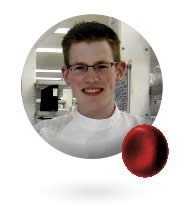
Nick Blackburn
Menzies Research Institute
Cancer Genetics
What's the secret of life? Your guess is as good as mine, but for me, I think the secret is hiding in the story that is our DNA. DNA is made up of chemical molecules called nucleotides and can be found inside the cells of our bodies. Our bodies are made up of over 100 trillion cells most of which contain around 2.9 million nucleotides of DNA each; that's a lot of DNA in one person!
The easiest way to explain DNA is to think of it like a book. This book, contained within nearly all of the cells of your body tells a story about you. It tells us why your eyes are blue (or brown, or green, or grey, or red with yellow spots...), why your hair is blonde (or brown, or green, or grey, or red with yellow spots...) and why you're the tallest, shortest or somewhere in-between. DNA can tell us the story of the human race and it can tell us the story of you.
Technology is now at the point where we can read your DNA story from start to end. We certainly don't understand the entire story yet and there are whole chapters of the story that seem to be written in another language. However, we are at the stage where as scientists, we can look at the DNA and start to learn who are the heroes and who are the villains of the story. The villains of the story are changes to the DNA which result in diseases such as cancer, diabetes and cystic fibrosis.
 My research looks at the DNA of blood cancers, such as leukaemia, to find out why some people are more likely to get cancer than others. I investigate the DNA story across entire families where more than one family member has had a blood cancer. By reading the DNA story of these people I hope to find the changes in the DNA that predispose people to develop cancer. Finding out what these changes are and revealing the secrets in the DNA will help us to understand and fight diseases just like cancer.
My research looks at the DNA of blood cancers, such as leukaemia, to find out why some people are more likely to get cancer than others. I investigate the DNA story across entire families where more than one family member has had a blood cancer. By reading the DNA story of these people I hope to find the changes in the DNA that predispose people to develop cancer. Finding out what these changes are and revealing the secrets in the DNA will help us to understand and fight diseases just like cancer.
Science begins with questions. Simple, complex, random and sometimes even crazy questions. As scientists we can begin to find the answers to those questions.
I was one of those kids that asked a lot of questions. Questions like: "I wonder what happens if I... touch a hot iron?... stick a knife in a toaster?... collect samples from the dog's water bowl and see if I can find 'dog germs'?" None of which I recommend anyone try at home if they want to keep their parents happy!
At university I studied a Bachelor of Science, majoring in Biochemistry. Last year I completed a medical research honours degree at the Menzies Research Institute. This year I've just begun my PhD at the Menzies Research Institute in the field of cancer genetics and I'm very excited about my research and all the opportunities it may bring.
I never thought I'd be a scientist but I knew I loved learning and I always wanted to know more. As a scientist, that's what you do, you learn until you know everything about a topic; then you try to find out more.
To find out more visit www.menzies.utas.edu.au (Research at the Menzies Research Institute Tasmania), www.leukaemia.org.au (Information about blood cancers such as Leukaemia, https://www.genetics.edu.au (Information about DNA and the human genome)
